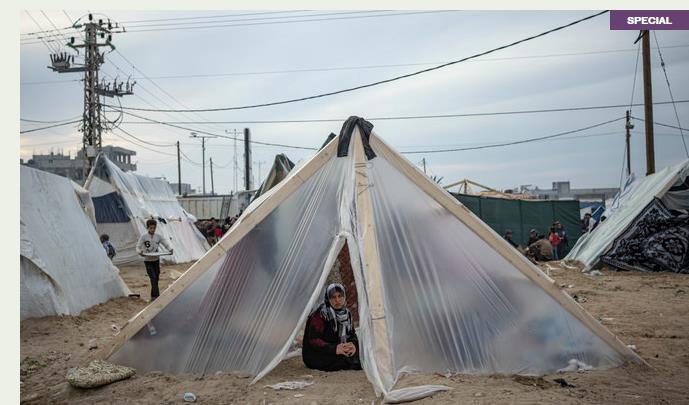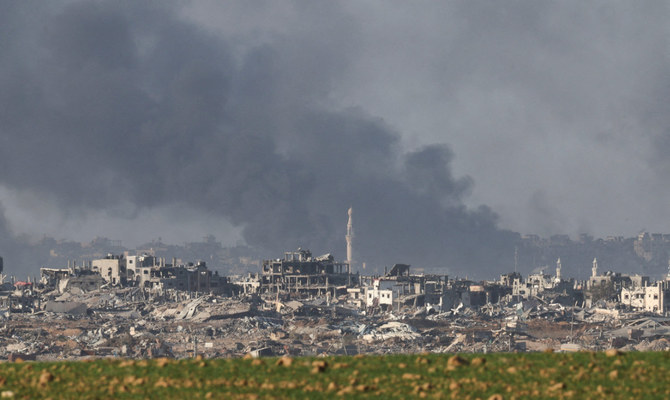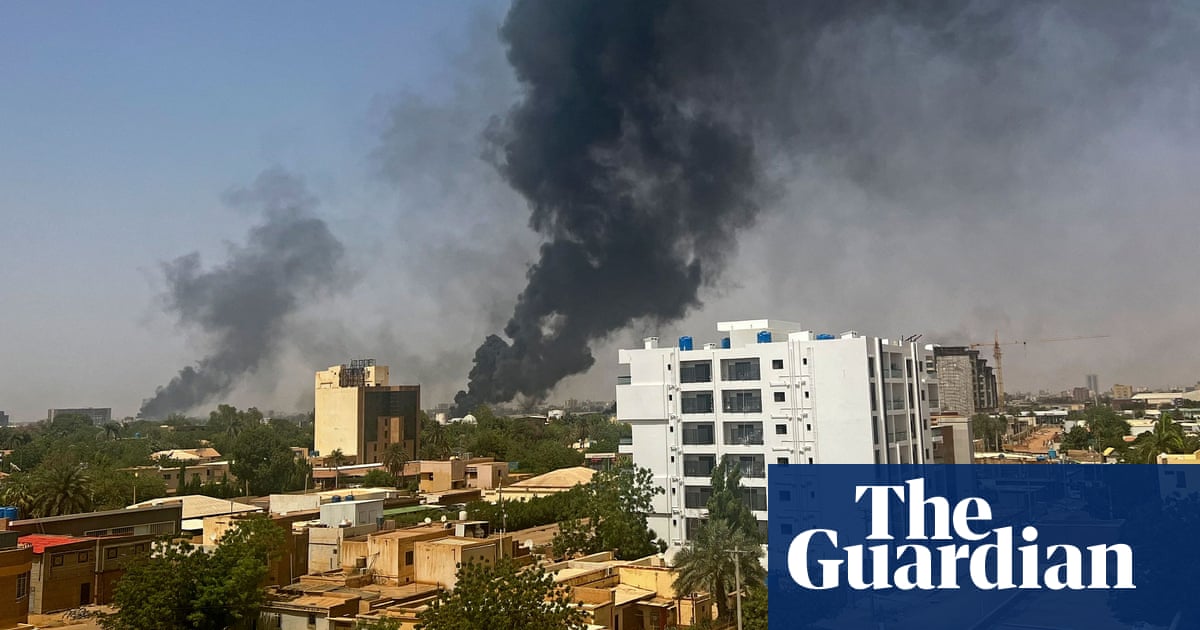
Israeli tanks fire shells toward several houses, leaving families trapped inside and unable to leave
Israel’s military operations in Rafah aimed at eradicating the last armed battalions of Hamas
GAZA: Heavy battles and bombardment hit Gaza City’s Shujaiya district for a fourth day on Sunday, months after Israel declared Hamas’s command structure dismantled in the northern area.
Tens of thousands of Palestinians have fled the devastated neighborhood, where the army said it has fought Palestinian militants both “above and below ground” in tunnels.
Months of on-and-off talks toward a Gaza truce and hostage release deal have meanwhile made little progress, with Hamas saying Saturday there was “nothing new” in a revised plan presented by US mediators.
The Israeli military said ground and air forces had carried out raids on compounds used by militants and “eliminated several terrorists” over the past 24 hours.
It also reported clashes in central Gaza and the southern Rafah area, a week after Prime Minister Benjamin Netanyahu declared that the “intense phase” of the war raging since October 7 was nearing an end.
The United Nations humanitarian agency OCHA estimated that “60,000 to 80,000 people were displaced” from Shujaiya since new fighting broke out there on Thursday and the army issued evacuation orders.
For those who remain, “our lives have become hell,” said 50-year-old Shujaiya resident Siham Al-Shawa.
She told AFP people were trapped as strikes could happen “anywhere” and “it is difficult to get out of the neighborhood under fire.”
“We do not know where to go to protect ourselves.”
Netanyahu said Israeli “forces are operating in Rafah, Shujaiya, everywhere in the Gaza Strip.”
According to a statement from Netanyahu’s office, he told his cabinet that “dozens of terrorists are being eliminated every day.”
The war started with Hamas’s October 7 attack on southern Israel which resulted in the deaths of 1,195 people, mostly civilians, according to an AFP tally based on Israeli figures.
The militants also seized 251 hostages, 116 of whom remain in Gaza including 42 the army says are dead.
Israel’s retaliatory offensive has killed at least 37,877 people, also mostly civilians, according to data from the health ministry in Hamas-run Gaza.
Six people were killed in an air strike at dawn targeting a house in Rafah, said medics at Nasser Hospital where the bodies were taken.
Artillery shelling also rocked parts of the city, witnesses said.
The Israeli military launched a ground operation in Rafah in early May, leading to the closure of a key aid crossing.
United Nations and other relief agencies have voiced alarm over the dire humanitarian crisis and threat of starvation the war and Israeli siege have brought for Gaza’s 2.4 million people.
“Everything is rubble,” said Louise Wateridge from UNRWA, the UN agency supporting Palestinian refugees, speaking Friday from the city of Khan Yunis.
“There’s no water there, there’s no sanitation, there’s no food. And now, people are living back in these buildings that are empty shells.”
In Israel, thousands of protesters again took to the streets of Tel Aviv on Saturday, demanding greater efforts to return the remaining captives, and calling for early elections.
Former hostage Noa Argamani, 26, who was rescued in a June 8 raid, said in a video address that “we can’t forget about the hostages who are still in Hamas captivity, and we must do everything possible to bring them back home.”
About a month after US President Joe Biden outlined a truce plan, Washington last week presented “new language” for parts of the proposed deal, according to US news site Axios.
A Hamas official in Lebanon, Osama Hamdan, confirmed that the Islamist movement had received the latest proposal but said it presented “no real progress in the negotiations.”
Hamdan labelled the proposals “a waste of time” that aimed to give Israel “additional time... to practice genocide.”
Hamas has called for a permanent ceasefire and full Israeli withdrawal from Gaza, demands repeatedly rejected by Israel.
Netanyahu on Sunday said “Hamas is the only obstacle to the release of our hostages.”
With military and diplomatic “pressure... we will return them all,” he said.
The Gaza conflict has also led to soaring tensions on Israel’s northern border with Lebanon, where the army has traded cross-border fire with the Hezbollah movement, an Iran-backed Hamas ally.
Threats of a full-blown war have escalated this month.
Iran’s mission to the UN, on social media Saturday, said it “deems as psychological warfare” Israeli “propaganda about intending to attack Lebanon.”
It also warned its arch foe that, “should it embark on full-scale military aggression, an obliterating war will ensue” that could draw in more Tehran-aligned armed groups in the region.
Hezbollah on Sunday claimed several attacks on Israeli military positions, and Lebanese official media reported Israeli strikes in the border area.
The Shiite Muslim movement announced three deaths among its ranks.












